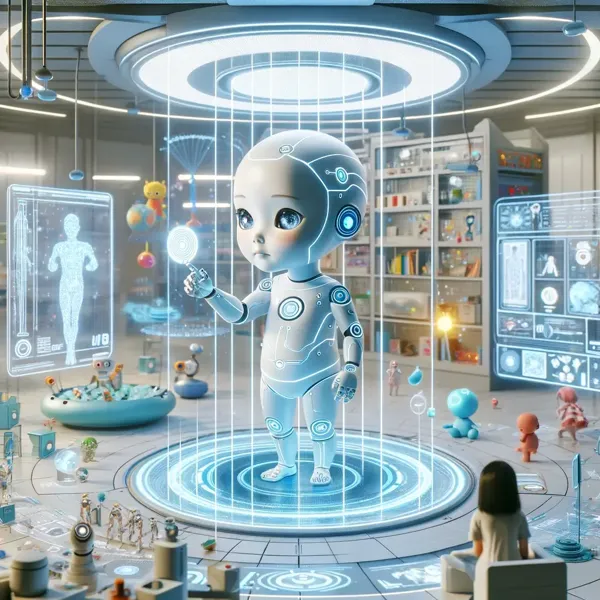In an era where artificial intelligence (AI) is not just a buzzword but a tangible part of our daily lives, scientists from China have taken a monumental leap forward. They recently introduced “Tong Tong,” the world’s first virtual AI child, at the “Frontiers of General Artificial Intelligence Technology Exhibition” in Beijing in late January 2024. This groundbreaking development has sparked a mix of curiosity and wonder about the potential of AI in emulating human growth and emotions.
A Leap into the Future with Tong Tong
Tong Tong is not your ordinary AI. She represents a new frontier in AI technology, capable of assigning tasks to herself such as tidying up her room or removing visible stains in her virtual living space. This ability to explore and interact with her surroundings allows Tong Tong to learn autonomously, continuously improving her capabilities beyond the confines of pre-fed training data.
But Tong Tong’s uniqueness doesn’t stop at task management. She engages with humor in conversations and refines her language skills based on verbal input, showcasing a level of interaction that blurs the lines between the virtual and the real.
Beyond Technology: The Emotional Connection
The scientists behind Tong Tong envision her playing a role in education and entertainment, with potential expansions into customer service and therapeutic support. The goal is for Tong Tong to evolve and connect on an emotional level with humans, a prospect that raises intriguing questions about the future relationship between humans and AI.
As we stand on the brink of this new era, the world watches with bated breath. How will humanity embrace a virtual entity like Tong Tong? Will AI with human-like qualities be accepted, or is society not yet ready for this technological leap? Only time will tell, but one thing is clear: the journey of Tong Tong marks a significant milestone in the journey of artificial intelligence, inviting us to reconsider the boundaries between human and machine.
The Ethical Implications and Future Possibilities
The introduction of Tong Tong into the realm of AI and human interaction brings with it a host of ethical considerations. As we navigate this uncharted territory, questions about privacy, autonomy, and the nature of intelligence itself come to the fore. The creation of a virtual AI child capable of emotional growth and learning raises the question of how these entities should be treated, what rights they might hold, and how they fit into the existing social fabric.
Moreover, the potential applications of AI children like Tong Tong extend far beyond their initial roles in education and entertainment. Their capacity for empathy and understanding could revolutionize fields such as elderly care, where companionship and emotional support are crucial. Similarly, their ability to learn and adapt could provide personalized learning experiences for children with special educational needs, offering a new paradigm for inclusive education.
Bridging the Gap Between Humans and AI
As technology continues to advance, the line between humans and AI becomes increasingly blurred. Tong Tong represents not just a technological marvel but a step towards a future where AI can not only mimic human behavior but also contribute meaningfully to society. This evolution prompts a reevaluation of our relationship with technology, encouraging us to consider AI not as a tool or a threat, but as a potential partner in addressing the complex challenges of the modern world.
The journey of Tong Tong and AI children like her is just beginning. Their development and integration into society will undoubtedly be a topic of much debate and discussion. However, one thing remains certain: the exploration of AI’s potential to mirror and complement human intelligence and emotion opens a world of possibilities that could reshape our future in profound ways.
















